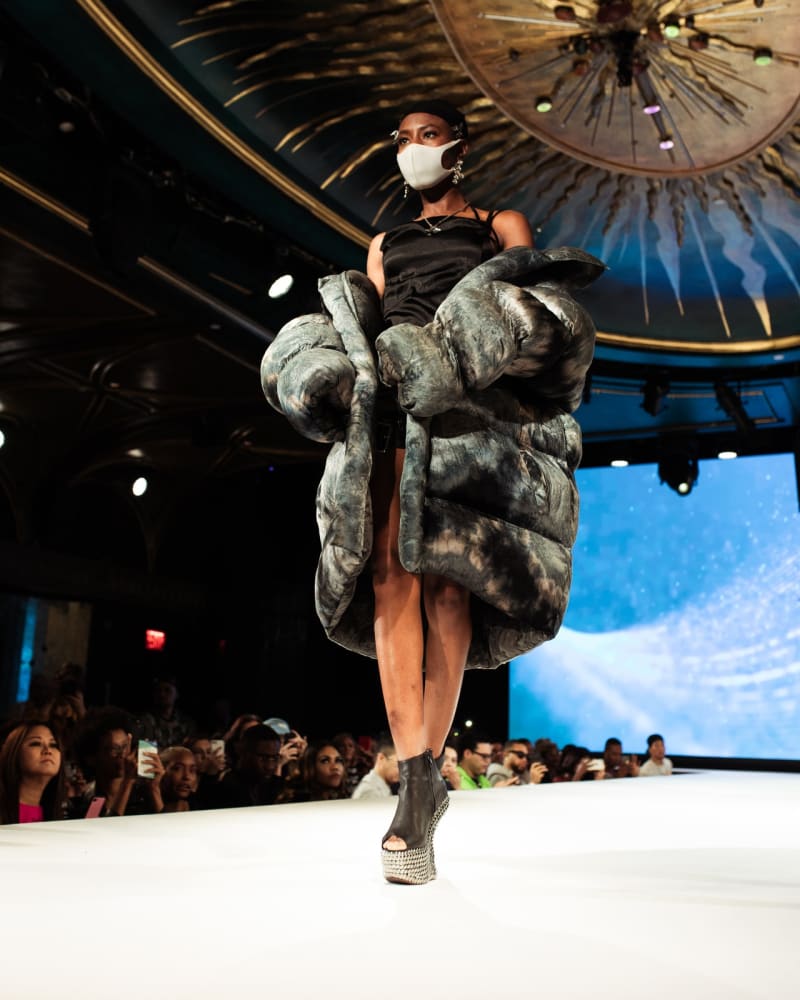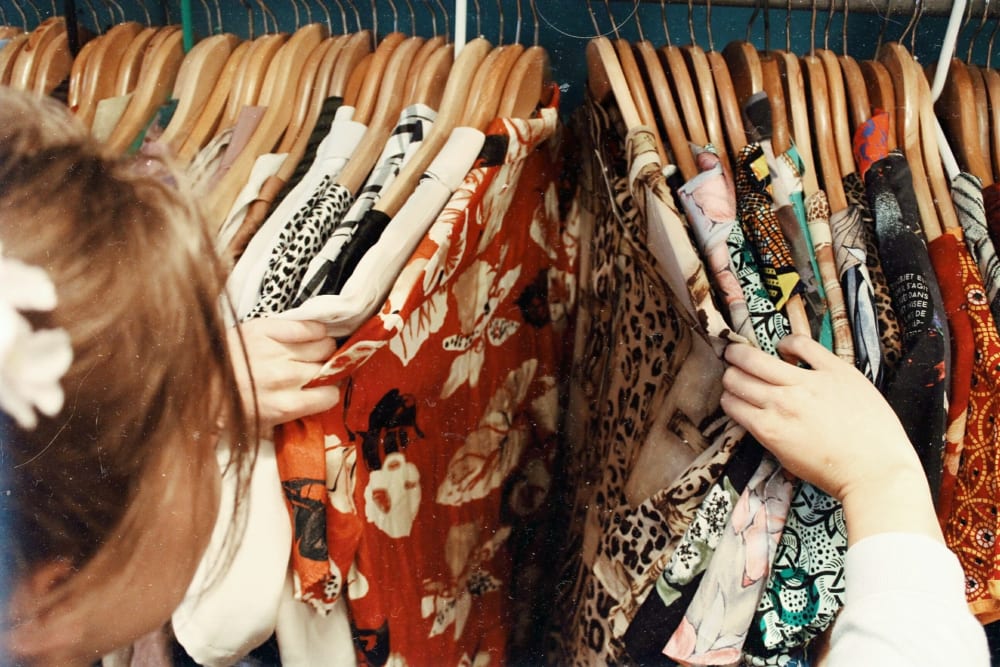In 1984, London Fashion Week was born! An event which gave designers an avenue to show off their collections and shout their message within the fashion community and a wider audience. Throughout the years, London Fashion Week has evolved with a changing world. It has been a place for visualised conception of political and societal messages. In its first year, Sarah Hamnett displayed a strong political and anti-war message. Creating a collection with strong words such as ‘58% DON’T WANT PERSHING’. This set the tone for designers using London Fashion Week as a way to voice and embody messages that meant a lot to them and this can be seen through the current wave of sustainable and ethical fashion brands partaking in London Fashion Week.
But now, as society becomes ever more aware of the issues surrounding sustainability and ethics in the fashion industry; how has London Fashion Week responded? When and how did sustainability and ethics begin to enter the London Fashion Week discourse? Is sustainability actually a conflict of interest for London Fashion Week? And what changes have been made in the past few years to create a more sustainable London Fashion Week?

2009 - Christopher Raeburn and Up-cycling
Sustainable fashion really came into the spotlight at London Fashion Week in February of 2009 when designer Christopher Raeburn debuted with his upcycled collection. Using decommissioned military stock, he created a collection of outerwear. The ultimate upcycle- reappropriating already waterproofed materials to create beautiful and functional new garments! His collection was very successful and gained him a lot of media interest as one of the first designers to be recycling in the creation of high fashion.
2014 - Vivienne Westwood as a Powerful Voice
In 2014, famous designer Vivienne Westwood did an Interview with Guardian Live in which she spoke at length about the need to “Buy less, choose well, make it last”! This is still a core message for sustainability advocates to this day. Since then, she has continued to put sustainability at the core of her collections. In 2020, 80% of her collection used materials which have reduced impact on the planet including organic cotton, recycled cotton, eco-denim, recycled synthetics, mulesing-free wool and 100% FSC certified viscose.
2017 - Fur Causes a Stir
In 2017, protestors hit London Fashion Week to raise awareness around the animal cruelty associated with the fashion industry. There were a large number of protesters who advocated for London Fashion Week to ban the use of animal fur. At the time of the protest the British Fashion Council, the organisers of London Fashion Week, stated that “it does not dictate what designers can or cannot design and has no control over their creative process” but it does “encourage designers to ensure that if they choose to work with fur, they work with reputable organisations that supply ethically sourced fur”. The issues raised by these protesters and others just like them, clearly had an effect, because in 2018 the British Fashion Council announced that they would be going fur free. It was also influenced by a survey conducted as part of its Positive Fashion Initiative which looked to promote best practises and positive changes in the British fashion industry.
2020 - British Fashion Council’s Positive Fashion Exhibition & Swap Shop
The Positive Fashion Initiative itself has really grown over the past few years; in 2020 there was a dedicated Positive Fashion Exhibition. It was open to both the public and trade participants, offering an opportunity for people to be immersed in sustainability and ethics. It gave guests the opportunity to discover new brands, designers and be shown the most compelling stories around sustainability, craftsmanship and ethics. It was a really good opportunity for a wide audience to be inspired by sustainability and to create positive changes in the industry.
As well as the Positive Fashion Initiative, in 2020 London Fashion Week also held a Swap Shop. It gave people an opportunity to bring a used item of clothing from their wardrobe and exchange it with someone else’s item; A great initiative to encourage people to not throw things away when they no longer need it and also highlighting the environmental impacts of buying new. This trend of selling or exchanging clothes is something that has definitely been on the rise over the past few years, with growing popularity of services like Depop for vintage fashion, Vestiaire Collective for designer collections and a myriad of clothes swap pop-ups.

2020 - London Fashion Week goes Digital
In the last couple of years, the pandemic has also had an impact on how London Fashion Week is run. The event has been held mostly online, which has prompted organisers and participants to reassess the environmental impacts of hosting these events. It has been estimated that over 241,000 tonnes of CO2 is emitted during the 4 fashion weeks held across London, Paris, New York and Milan annually. This includes emissions contributed by those travelling to these events, transportation of the clothes themselves and even the disposable water bottles that are handed out! While some of the scheduling for London Fashion Week is moving back to in person events with the loosening of restrictions, it will be interesting to see the lasting impacts of a more digitised London Fashion Week.
Can London Fashion Week ever be truly sustainable?
There have been changes, particularly over the past few years, which has led to what could be seen as a more sustainable London Fashion Week. But this does raise some fundamental questions. For example, is the move towards sustainability driven by London Fashion Week or the participating labels and brands themselves? Can London Fashion Week itself ever be truly sustainable? What else can be changed?
London Fashion Week is not a natural advocate for sustainable and ethical fashion. It drives the trend for high street retailers who find ways to produce the high fashion styles of London Fashion Week into cheaper, mass produced and largely unsustainable garments. While this is not necessarily the responsibility of London Fashion Week itself, it is an unfortunate result of high street stores attempting to stay ‘on trend’ with what begins at the London Fashion Week.
There is a long way to go in tackling sustainability in regards to the fashion industry and London Fashion Week does highlight this. It will be interesting to see how high fashion brands and the organisers respond to the growing conversation and passion surrounding positive, sustainable and ethical fashion in the coming years. And that is where we as consumers, come in. As evidenced with the ban on fur and the swap shop initiative, it’s clear that consumer demands drive change in the fashion industry. Brands are attuned to consumer sentiment and as consumers we have the power to influence brands to produce what we want to buy.
London Fashion Week has changed a lot since the first show in 1984. It is now one of the biggest platforms for high fashion designers to create and exhibit their collections. There has been an increase in the representation of sustainable and ethical fashion, especially over the last 10 years. And we look forward to highlighting some of the sustainable and ethical brands that will be showcased at the 2022 London Fashion Week, which starts today!
However, progress needs to occur more quickly and London Fashion Week events are often not the turning point for these changes, it is the brands who are reacting to our needs and wants as consumers, who continually drive the sustainability agenda. Making more conscious fashion choices, allows your voice to be heard and this will continue to shift the sustainable and ethical fashion agenda in the fashion weeks of the future!
Like what you just read? Share it on:

